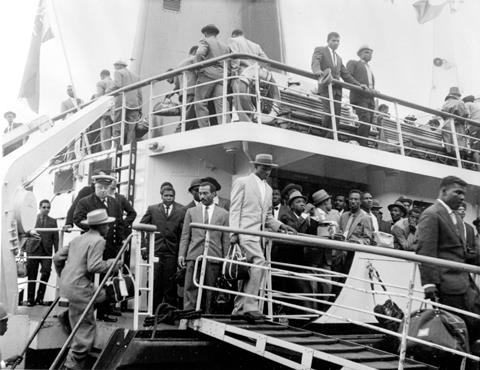The Law Society recognised five solicitors in the second year of its Legal Heroes awards. They were selected from among 470 nominations and a shortlist of 19 chosen because of the impact of their work beyond the bounds of their profession to make a profound and lasting impact on the lives of others and society.
Pauline Campbell, a senior lawyer at Waltham Forest Council, author, and advocate for social justice and the Windrush community, was told at 15 that she was ‘not A-level material’. That dashed her dream of becoming a lawyer until she took up the training in her 30s and qualified at 41. Since then she has sought to use her skills to help others overcome adversity, creating a ‘safe space clinic’ at work, chairing the council’s Race Equality Network and playing a key role in tackling the ethnicity pay gap.

The daughter of Windrush generation parents who came to England from Jamaica in the 1960s, she is a tireless advocate for others in the community affected by the scandal. Campbell has provided pro bono advice to over 100 victims, serves as a legal adviser for Justice4Windrush and has spoken in parliament on reparations.
She has also written a memoir, Rice & Peas and Fish & Chips, which chronicles her journey as a black woman in the profession and addresses the importance of racial equality.
‘Many in my generation had their futures stolen from them’ by discouraging teachers and the system, says Campbell. She tries to give a voice to others who ‘like me felt that they were under the radar’.
Stephen Kinsella was recognised for his contributions to legal practice and social justice. A specialist EU anti-trust lawyer with over 30 years’ experience, he was a partner at Flint Global and has dedicated his career to serving corporate clients and the wider public interest.
Together with David Graham of Changing Ideas, and philanthropy expert and law reformer Charles Keidan, he founded Law for Change in 2022. This initiative seeks to harness the power of law to address societal harms and promote social progress through strategic legal action and philanthropy.
Having grown frustrated that ‘access to justice seemed to be getting harder for people’, he says the trio set up Law for Change to provide funding for ‘good cases brought by genuinely expert lawyers, across the whole range of public law’. Since its launch, Kinsella says, it has financially supported about 45 cases.
‘Astonished’ to win a Hero award, he says the raised profile ‘has already led to a number of approaches from lawyers with interesting cases’.
Kinsella is also the founder of campaigning group Clean Up The Internet, which seeks to improve online discourse, and a board member of pressure groups Hacked Off and Reprieve.
Duncan McNair, a partner at London firm Spencer West, has more than 30 years’ experience in complex litigation, but it is for his work as an advocate for animals that he was recognised. In 2015, after writing a report on animal welfare standards for the RSPCA, he founded Save the Asian Elephants, a non-profit organisation dedicated to protecting the endangered species.
His tireless efforts have led to significant progress, including landmark animal protection legislation – the Animals (Low-Welfare Activities Abroad) Act 2023.
Having ‘always had an affinity for the animal kingdom’, McNair was ‘horrified and aghast’ on a fact-finding expedition by the ‘cruel’ treatment of Asian elephants. On his return to the UK, he ‘resolved to do something about it’.
He is delighted that the Law Society has for the first time recognised the work of an animal welfare charity. This is, he suggests, a ‘reflection of how wider society is developing in remembering that our purpose in life is not to satisfy ourselves as a species, but to preserve and protect the animal kingdom, its territories and terrain upon which humankind depends’.
As ‘guardians of the forests’ on which humans depend, McNair says that Asian elephants are ‘crucial as parts of the animal kingdom and life on earth’ and play a vital role in helping to stop global warming.
He hopes that his award will help raise awareness of the issue and increase support for ending ‘brutal animal tourism’.
Andrew MacLeod has dedicated his career to tackling sexual abuse committed overseas, securing parentage declarations and support orders, and assembling a team of pro bono lawyers to obtain justice for affected children.
Chairman of Griffin Law, Kent, and a visiting professor of war and security studies at King’s College London, his humanitarian work includes leading UN disaster responses in Pakistan, and helping minimise civilian casualties in the Balkans and Rwanda with the Red Cross International Committee. A decorated veteran, author and philanthropist, his pioneering efforts have set new standards in humanitarian law and child protection.
‘The more senior I became in the aid industry the more I became aware of the huge scale of abuse of women and children by aid workers,’ says MacLeod, who got involved in the work ‘to hold men accountable, because the people who should do it, consciously choose not to’.
He is pleased to have won the award to raise awareness and hopes that as a result ‘more children will get justice and fewer men will abuse’.
Kevin McManamon, a partner at Geldards in London, was recognised for helping families with special educational needs and disabilities.
With almost 20 years’ experience, he is the only solicitor in the country with expertise in special educational needs law as it applies under the diverging laws of England and Wales, combined with mental capacity law.
Partially sighted, his understanding of the challenges faced by disabled people drives his mission to ensure justice and equality through the law. McManamon became a lawyer because he ‘wanted to have a positive impact on people’s lives.
‘I started off thinking I could change the world,’ he reflects, ‘but have realised that having a small positive impact on each client and their child is the best I can do. That is rewarding enough.’
His first legal job after leaving university was with the Disability Law Service charity, where he ‘fell in love’ with education law.
He offers pro bono legal advice and workshops, making the legal process more accessible and understandable for those in need. His work has transformed legal support for countless families.
‘I hope the award showcases the brilliant work undertaken by solicitors up and down the country,’ McManamon concludes. ‘If it motivates others to get into areas such as education law that would be the icing on the cake. More importantly, if it highlights the area of special educational needs and raises awareness of the struggles parents have, that would mean the world to me.’
Catherine Baksi is a freelance journalist
































No comments yet